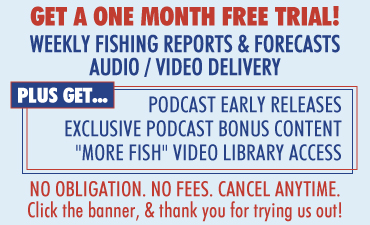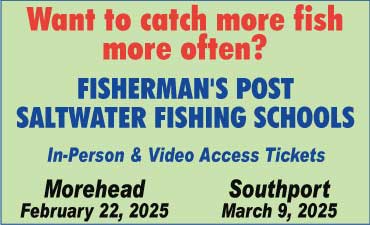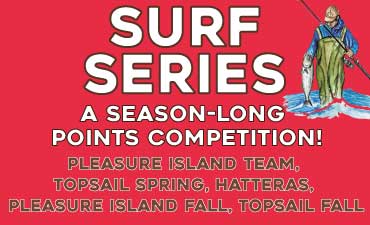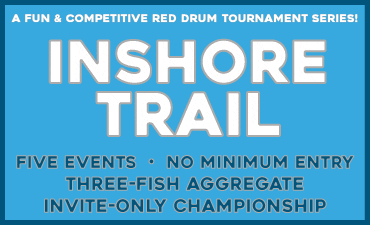Releases – April 12, 2012
NOAA Fisheries requests public comments on proposed regulations for Amendment 18A to the Fishery Management Plan for the Snapper-Grouper Fishery of the South Atlantic Region. The primary purpose of Amendment 18A is to implement management measures that would optimize fishing opportunities for black sea bass, and improve data reporting in the for-hire sector of the snapper-grouper fishery.
Comments on the proposed rule for Amendment 18A must be received no later than April 23, 2012.
NOAA Fisheries proposes to implement Amendment 24 to the Fishery Management Plan for the Snapper-Grouper Fishery of the South Atlantic Region, as prepared by the South Atlantic Fishery Management Council. If implemented, this rule would establish red grouper commercial and recreational sector annual catch limits (ACLs); establish red grouper sector accountability measures (AMs); and remove the combined gag, black grouper, and red grouper commercial quota, and commercial and recreational sector ACLs and AMs.
The intent of this rule is to specify ACLs and AMs for red grouper while maintaining catch levels consistent with achieving optimum yield for the red grouper resource. Additionally, Amendment 24 would implement a rebuilding plan for red grouper in the South Atlantic.
Comments on the proposed amendment are due April 30, 2012.
The N.C. Wildlife Resources Commission has completed renovations to the Cedar Point Boating Access Area, and it is now open to the public.
The site, located on N.C. 24 in Cedar Point east of the White Oak River Bridge, provides access to the Intracoastal Waterway. Workers added a 70-foot fishing pier, along with a 2-lane boat ramp, which replaces a ramp with one lane. A newly paved lot has eight single-vehicle spaces and 38 spots for vehicles with trailers.
“This site is very popular with anglers and recreational boaters, especially now that we’re into the warmer months,” said Erik Christofferson, chief of the Commission’s Division of Engineering Services. “We are grateful for the funding we received from sales of the Coastal Recreational Fishing License that allowed us to renovate this site, as well as a partnership with Carteret County, which allowed us to increase the parking. We are also grateful to the Town of Cedar Point, which has agreed to do the maintenance on this site.”
Sales of the Coastal Recreational Fishing License paid for $125,000 of the renovations. Motorboat registration receipts paid for the rest.
For more information on boating in North Carolina, including an interactive map of more than 200 free, 24-hour boating access areas, visit www.ncwildlife.org and click on “boating.”
The recreational season for vermilion snapper reopened on April 1, 2012. The daily bag limit is 5 vermilion snapper per person (in addition to the aggregate bag limit of 10 snapper), with a minimum size limit of 12″ Total Length.
The recreational season ends annually on November 1, 2012. The commercial fishery remains closed, and the split-season will reopen on July 1.
Upon review of the latest black sea bass recreational data from last year (waves 1 – 6), the Atlantic States Marine Fisheries Commission’s Summer Flounder, Scup, and Black Sea Bass Management Board has modified the percent that states may liberalize their 2012 recreational management measures to achieve the 1.32 million pound (942,857 fish) harvest limit for the 2012 fishery.
The northern region states of Massachusetts through New Jersey will implement measures that achieve a 37% liberalization throughout the region and a 32% liberalization coastwide; the percent of liberalization will vary by state. Northern region states had the option to collectively liberalize regulations by 41% but opted to be more conservative.
State-specific regulations follow below:
(1) Massachusetts, 14 inch Minimum Size, 10 fish Possession Limit (during Open Season May 11 – June 24), 20 fish Possession Limit (during Open Season June 25 – October 31);
(2) Rhode Island, 13 inch Minimum Size, 15 fish Possession Limit, Open Season June 15 – December 31;
(3) Connecticut, 13 inch Minimum Size, 15 fish Possession Limit, Open Season June 15 – December 31;
(4) New York, 13 inch Minimum Size, 15 fish Possession Limit, Open Season June 15 – December 31;
(5) New Jersey – Still finalizing measures;
(6) Delaware, 12.5 inch Minimum Size, 25 fish Possession Limit, Open Season May 22 – October 14 & November 1 – December 31;
(7) Maryland, 12.5 inch Minimum Size, 25 fish Possession Limit, Open Season May 22 – October 14 & November 1 – December 31 (Season may change depending on federal regulations);
(8) Virginia, 12.5 inch Minimum Size, 25 fish Possession Limit, Open Season May 19 – October 14 & November 1 – December 31;
(9) North Carolina, 12.5 inch Minimum Size, 25 fish Possession Limit, Open Season May 19 – October 14 & November 1 – December 31.
Since the Board’s approval of Addendum XXII and the resultant 2012 state recreational management measures in February 2012, new 2011 recreational harvest estimates were released by the National Marine Fisheries Service. The data indicates the projections used to form the basis of this year’s regulations underestimated the 2011 harvest. Coastwide recreational harvest for the 2011 black fishery is now estimated at 713,478 fish (versus the initial estimate of 654,142 fish).
As a result of the new estimate, northern states will still be able to liberalize their 2012 recreational management measures but not to the extent that they would have under the previous estimate (initial liberalization was 57%). The northern states will be working over the next month to finalize their recreational black sea bass management measures.
Based on the stock projections completed in 2011, the black sea bass stock is not overfished and overfishing is not occurring. The projections indicate the stock is at about 111% of its biomass target.
For more information, please contact Toni Kerns, Senior Fishery Management Plan Coordinator for Management, at tkerns@asmfc.org or (703) 842-0740.
With the launch of a new mobile website on April 2, the N.C. Wildlife Resources Commission put a wealth of information and services at the fingertips of on-the-go hunters, anglers, boaters, and other outdoors enthusiasts to get them in the field, in the woods, or on the water quickly and easily.
The new site is designed for small screens and touch technology common in smart phones, tablets, and other portable devices. Mobile-device users accessing the Commission’s full website will be redirected automatically to the mobile site where they can purchase licenses, report harvests, check regulations, find a nearby wildlife service agent, and view interactive maps of boating access areas, shooting ranges, and game lands.
From the mobile site, they also will be able to access other information, such as:
(1) A contact list of agency phone numbers and e-mail addresses;
(2) A sunrise/sunset table;
(3) Size and creel limits for saltwater fishes; and,
(4) Links to the agency’s latest news and events, as well as its social media sites —Twitter, Facebook, Google+, YouTube, and the Conserve & Protect blog.
For more information on fishing, hunting, trapping, boating, and wildlife watching in North Carolina, visit www.ncwildlife.org.
Reelin’ for Research is proud to announce the 4th annual Reelin’ for Research Fishing Tournament benefiting The North Carolina Children’s Promise. The tournament will once again be based out of Morehead City, NC.
The event is a one day offshore meat fishing tournament. The winners are determined by the combined weight of each team’s three largest fish. Tuna, dolphin, and wahoo are the target species.
The North Carolina Children’s Promise supports The N.C. Children’s Hospital, which protects the health and well-being of North Carolina’s Pediatric Hematology-Oncology patients by “aligning premier health care practitioners, world class medical education, and innovative research to provide the highest quality, family-centered care available, regardless of cost.”
The tournament funds that are donated to the North Carolina Children’s Promise will be allocated directly toward pediatric oncology research through providing a fellowship.
Reelin’ for Research was founded in 2008 by Richard Montana and a group of friends from Greensboro, NC, after his father, Tony, lost his life to cancer in 2005. Their ambition was to help fund research to promote awareness and state-of-the art care for younger generations afflicted with terminal disease.
“My Dad was very thankful for his life, experiences, and many blessings. He felt like nobody should have to suffer from cancer, especially the young children who might not have the opportunities he had,” notes Richard Montana.
The inaugural tournament held in 2009 boasted proceeds just shy of $30,000. Since then, Reelin’ for Research has been able to donate over $200,000 to the N.C. Children’s Hospital. Their goal is to provide the N.C. Children’s Hospital with over $1,000,000 by 2019.
The Reelin’ for Research planning committee would like to invite those parties who are interested in joining the cause, or to simply make a donation, to please visit the website www.reelinforresearch.org for detailed information.
On April 4, the Seacoast Anglers Association of North Myrtle Beach, SC, presented a $1,000 check to the Jim Caudle Reef Foundation to help grow the artificial reef, located just 2.5 miles off the Little River Inlet. The money was raised by the Seacoast Anglers Fishing Club through various fund raisers and the aluminum can recycling program they started six years ago.
“Our club collects aluminum cans from our members and from marinas and boat landings in the North Myrtle Beach area. We then take them to be recycled,” stated Chris Carbone, spokesman for the Seacoast Anglers.
Ron McManus, Chairman of the Jim Caudle Reef Foundation, accepted the check and said the money will be used to purchase reef cones, which build the artificial reef and give the fish a place to thrive.
“This is a win-win for the environment and community,” stated McManus. “I am really pleased with what the Seacoast Anglers have done for the reef over the years.”
The Seacoast Anglers Association has donated almost $10,000 to the Jim Caudle Reef over the last seven years.
Among other charities the Seacoast Anglers Association supports is the “Hook a Kid on Fishing.” Since 2006, they have taken over 600 underprivileged kids and 120 chaperones out fishing on the ocean. Most of these kids had never had a fishing pole in their hands and most likely would not have the chance to experience the ocean and our natural resources.
Anyone interested in joining the Seacoast Anglers Association can visit www.seacoastanglersassociation.com.





